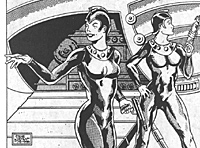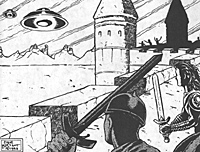 The sound of an approaching underling
attracted the attention of the leader, who was gazing
out the viewport at a mottled blue-green globe.
The sound of an approaching underling
attracted the attention of the leader, who was gazing
out the viewport at a mottled blue-green globe.
"Report! " he snapped, rattling his chitinous arm plates.
The lackey stuttered, "Uh, well, your Excellency, there seems to be a few unusual energy readings we haven't been able to pin down yet...."
"Irrelevant." He waved a claw. "Your conclusions.
"The primitive natives of this world have no capacity to resist our forces," came the nervous answer.
"Perfect," replied the leader, clicking his mandibles in satisfaction. "His Supreme Highness will be most pleased. Another easy conquest for our glorious empire." He looked back at the globe.
"Let the invasion begin."
Introduction
Aliens are usually found only in science fiction role-playing games, but it doesn't always have to be that way. Before SF was developed, stories about contacts with creatures from other worlds were in the province of fantasy writing. Poul Anderson's classic, The High Crusade, told the story of a 14th century English baron and his followers who are confronted with an alien invasion, with a background very similar to a medieval-based fantasy setting.
There is no reason that a gamemaster (GM) couldn't mix fantasy and outer space on special occasions. Nor should aliens be restricted from other milieus. Any game in the past or modern eras can have visitors from space as a special, onetime encounter.
Old movie serials, superhero, supernatural, horror, and adventure fiction often had aliens show up to terrorize the world. H. G. Wells' "War of the Worlds" is the original alien invasion story, and is set in the Victorian Era. The monsters in H. P Lovecrafts tales were mostly from other worlds. Thus many types of campaigns are compatible with an extraterrestrial encounter, including dark future and cyberpunk. Alien is really a horror story set in outer space.
In some ways aliens work better in genres other than regular SF, because in those games they're well-known, being an all too common part of the background, usually without any strange and awesome powers that sets them apart from PCs (player-characters). In fact, PCs may get to be aliens in SF games, which is fun, but takes a lot of the mystery out of play.
Biology
From the GM's point of view, one good thing about aliens is that they're... alien. They're not just another monster. Orcs with blasters get old really fast. Creatures from space should be treated as outside of the normal rules, and have unique and unknown abilities. Psionic skills are not uncommon. Nothing stops a party cold like being told their fireballs or machine guns have no effect whatsoever on the nasties. There isn't a better way to create excitement among players than to have them run into something which isn't in the book.
Many aliens look like humans, making it easy for them to keep their true identities secret. Thus the party, which may be on their guard for trolls: cyber-assassins, or ghosts, barely notices someone who seems just a little eccentric.
Non-humans come in a variety of shapes and sizes and can have such unusual abilities as invisibility, resistance to heat or cold, shape- shifting, and the like. Some are not autonomous individuals, but are part of a "hive" race or mentality. A few are very large or very small. Big cranium types are common, and some aliens are nothing more than oversized brains. Of course, many are repulsive in the extreme. For people who are not used to seeing beings of types other than themselves, fear and loathing are common responses. Space creatures may deliberately use their hideous appearance to terrorize the population.
The party may make friends with an alien, who can provide help or annoying advice from time to time. Since the idea of gainful employment may be impractical, the creature will probably end up as a freeloader. Likewise, they can create an recurring adversary by angering some obnoxious ET.
 Psychology
Psychology
Aliens not only look different, but think in ways unlike those of humans. As a result their actions may be unpredictable and bizarre. Difficulty in communications is a common problem. Typically, aliens involved in military or diplomatic missions desire to contact the highest level authority available, while those who are covert or secret assignments want to limit knowledge of their presence to as few individuals as possible. Aliens rarely understand or care about the function of the media or normal channels of communication.
The typical scenario begins with the PCs or their friends glimpsing an alien landing. The party's warnings go unheeded because society dismisses them as cranks. Soon, mysterious happening begin, which eventually provoke a response from the still-unbelieving public, perhaps directed at the characters. The party is left to deal with the situation on their own.
If they are successful, the dilemma ends there. If not, the invader makes itself known, possibly by a rampage, and the people turn to the party for help. All resources are mustered to deal with the situation, and the PCs must come up with a plan to resolve the problem in a final confrontation.
Anyone who is identified as having come in contact with space creatures will generate feelings of awe or rejection among the public. Fear of the unknown is mote scary to most people than the actual unknown entity itself. Once humans accept the idea of extraterrestrial life, it will be business as usual.
In all types of societies, government takes a leading role in dealing with foreigners, especially those of great power and importance. The same holds true of space visitors, and public leaders will often try to cover up evidence of otherworldly encounters, or control the situation as best they can by taking aliens and witnesses into protective custody. Anything that can be construed as a threat to national security will provoke a military response, whether it's calling out the town guard or launching a barrage of nuclear missiles.
Some ETs, by their own attitudes or appearances, may create such feelings of disgust and hate that conflict with humans is inevitable. If not, once formal communications are established, the aliens will be treated as distinguished visitors albeit closely watched ones. If there is any political or commercial advantage to be gained by dealin, with the space creatures, you can be sure an official or businessman will make a overwhelming effort in that area.
In some cases the aliens will be naive enough to play into these people's hands; other times they will be such sharp dealers that the earthlings will be left on the short end of the stick.
Technology
Another important point is technology. The aliens' capabilities are far beyond the PCs'. This does not necessarily make them invincible. Although the aliens may be very advanced, they aren't immune to mistakes, or doing stupid things like leaving the door to their spaceship open or forgetting about basic hygiene (earth germs and stuff).
Energy weapons, from heat rays to disintegration beams, are standard equipment for space beings. Some employ robots as well. Aliens employ many types of gear other than weapons, much of which appears miraculous to earth people. Flying is their most common mode of long distance transportation, either by rocket belt, gravity platform, shuttlecraft, or their own ship.
Letting some alien technology fall into the party's hands is an appropriate reward for fighting off an invasion, but do not allow this to unbalance the game. Most complex equipment will be incomprehensible. The PCs may learn to operate a device, but they probably won't understand the principles behind it. Recharges and replacement parts are unavailable, of course, and local conditions or lack of maintenance may cause the equipment to deteriorate rapidly. Some gadgets have built-in safety mechanisms that prevent or punish tampering and abuse.
Most aliens will have a spaceship. A few may be dropped off by a mothership or arrive by matter transmission beam. There is virtually no chance of PCs being able to fly a ship, but they might accidentally activate the autopilot while inside, and take off for parts unknown. Certainly if the government gets hold of the vehicle it will never be seen again.
Back to Shadis #26 Table of Contents
Back to Shadis List of Issues
Back to MagWeb Master List of Magazines
© Copyright 1996 by Alderac Entertainment Group
This article appears in MagWeb (Magazine Web) on the Internet World Wide Web.
Other military history articles and gaming articles are available at http://www.magweb.com